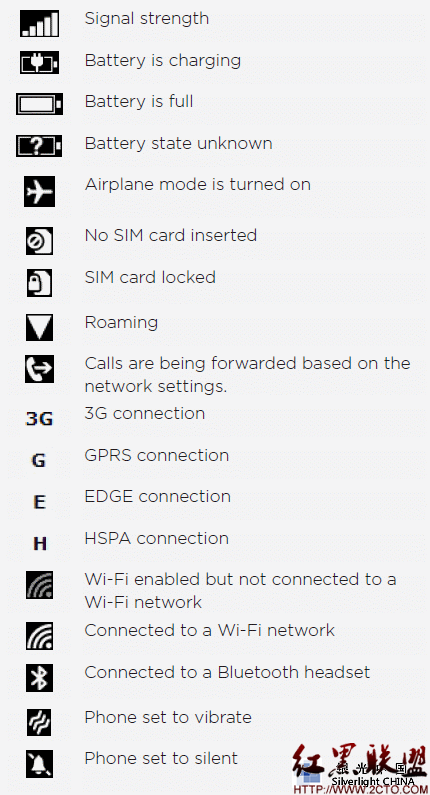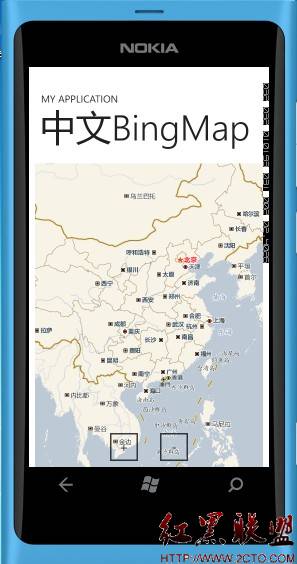iphone中的UITouch
手指在屏幕上能达到的精度和鼠标指针有很大的不同。当用户触击屏幕时,接触
区域实际上是椭圆形的,而且比用户想像的位置更靠下一点。根据触摸屏幕的手指、手指的尺寸、手指接触屏幕的力量、手指的方向、以及其它因素的不同,其“接触部位”的尺寸和形状也有所不同。底层的多点触摸系统会分析所有的这些信息,为您计算出单一的触点。
UIResponder 是所有响应者对象的基类,
它不仅为事件处理,而且也为常见的响应者行为定义编程接口。UIApplication、UIView、和所有从UIView 派生出来的UIKit 类(包括UIWindow)都直接或间接地继承自UIResponder类。
- (void)touchesBegan:(NSSet *)touches withEvent:(UIEvent *)event {
UITouch* touch = [touches anyObject];
NSUInteger numTaps = [touch tapCount];
if (numTaps < 2) {
[self.nextResponder touchesBegan:touches withEvent:event];
} else {
[self handleDoubleTap:touch];
}
}
缺省情况下,视图会接收触摸事件。但是,您可以将其userInteractionEnabled
属性声明设置为NO,关闭事件传递的功能。
在一定的时间内关闭事件的传递。应用程序可以调用UIApplication 的
beginIgnoringInteractionEvents 方法,并在随后调用endIgnoringInteractionEvents 方法来实现这个目的。
缺省情况下,视图只接收多点触摸序列的第一个触摸事件,而忽略
所有其它事件。如果您希望视图处理多点触摸,就必须使它启用这个功能。在代码或Inte易做图ce Builder 的查看器窗口中将视图的multipleTouchEnabled 属性设置为YES,就可以实现这个目标。
将事件传递限制在某个单独的视图上。缺省情况下,视图的exclusiveTouch 属性被设置为NO。将这个属性设置为YES 会使相应的视图具有这样的特性:即当该视图正在跟踪触摸动作时,窗口中的其它视图无法同时进行跟踪,它们不能接收到那些触摸事件。
多点触摸:
- (void)touchesBegan:(NSSet *)touches withEvent:(UIEvent *)event;
- (void)touchesMoved:(NSSet *)touches withEvent:(UIEvent *)event;
- (void)touchesEnded:(NSSet *)touches withEvent:(UIEvent *)event;
- (void)touchesCancelled:(NSSet *)touches withEvent:(UIEvent *)event
当一个或多个手指触碰屏幕时,发送touchesBegan:withEvent:消息。
当一个或多个手指在屏幕上移动时,发送touchesMoved:withEvent:消息。
当一个或多个手指离开屏幕时,发送touchesEnded:withEvent:消息。
当触摸序列被诸如电话呼入这样的系统事件所取消时,发送touchesCancelled:withEvent:消息。
上面这些方法都和特定的触摸阶段(比如UITouchPhaseBegan)相关联,该信息存在于UITouch 对象的phase 属性声明中。
为了处理给定阶段的事件,响应者对象常常从传入的集合参数中取得一或多个UITouch 对象,然后考察这些对象的属性或取得它们的位置(如果需要处理所有触摸对象,可以向该NSSet 对象发送anyObject 消息)。UITouch 类中有一个名为locationInView:的重要方法,如果传入self 参数值,它会给出触摸动作在响应者坐标系统中的位置(假定该响应者是一个UIView 对象,且传入的视图参数不为nil)。另外,还有一个与之平行的方法,可以给出触摸动作之前位置(previousLocationInView:)。UITouch 实例的属性还可以给出发生多少次触
碰(tapCount)、触摸对象的创建或最后一次变化发生在什么时间(timestamp)、以及触摸处于什么阶段(phase)。
- (void) touchesEnded:(NSSet*)touches withEvent:(UIEvent*)event
{
UITouch *touch = [touches anyObject];
if ([touch tapCount] == 2) {
CGPoint tapPoint = [theTouch locationInView:self];
// Process a double-tap gesture
}
}
在touchesEnded:withEvent:方法中,当触击次数为一时,响应者对象就向自身发送一个performSelector:withObject:afterDelay:消息,其中的选择器标识由响应者对象实现的、用于处理单击手势的方法;第二个参数是一个NSValue 或NSDictionary 对象,用于保存相关的UITouch 对象;时延参数则表示单击和双击手势之间的合理时间间隔。
在touchesBegan:withEvent:方法中,如果触击次数为二,响应者对象会向自身发送一个cancelPreviousPerformRequestsWithTarget:消息,取消当前被挂起和延期执行的调用。如果触碰次数不为二,则在指定的延时之后,先前步骤中由选择器标识的方法就会被调用,以处理单击手势。
在视图中跟踪碰擦手势
#define HORIZ_SWIPE_DRAG_MIN 12
#define VERT_SWIPE_DRAG_MAX 4
- (void)touchesBegan:(NSSet *)touches withEvent:(UIEvent *)event
{
UITouch *touch = [touches anyObject];
startTouchPosition = [touch locationInView:self];
}
- (void)touchesMoved:(NSSet *)touches withEvent:(UIEvent *)event
{
UITouch *touch = [touches anyObject];
CGPoint currentTouchPosition = [touch locationInView:self];
// If the swipe tracks correctly.
if (fabsf(startTouchPosition.x - currentTouchPosition.x) >= HORIZ_SWIPE_DRAG_MIN
&&
fabsf(startTouchPosition.y - currentTouchPosition.y) <=
VERT_SWIPE_DRAG_MAX)
{
// It appears to be a swipe.
if (startTouchPosition.x < currentTouchPosition.x)
[self myProcessRightSwipe:touches withEvent:event];
else
[self myProcessLeftSwipe:touches withEvent:event];
}
else
{
// Process a non-swipe event.
}
}
处理复杂的多点触摸序列
- (void)touchesBegan:(NSSet *)touches withEvent:(UIEvent *)event
{
UITouch *touch = [[event allTouches] anyObject];
// Only move the placard view if the touch was in the placard view
if ([touch view] != placardView) {
// On double tap outside placard view, update placard's display string
if ([touch tapCount] == 2) {
[placardView setupNextDisplayString];
}
return;
}
// "Pulse" the placard view by scaling up then down
// Use UIView's built-in animation
[UIView beginAnimations:nil context:NULL];
[UIView setAnimationDuration:0.5];
CGAffineTransform transform = CGAffineTransformMakeScale(1.2, 1.2);
placardView.transform = transform;
[UIView commitAnimations];
[UIView beginAnimations:nil context:NULL];
[UIView setAnimationDuration:0.5];
transform = CGAffineTransformMakeScale(1.1, 1.1);
placardView.transform = transform;
[UIView commitAnimations];
// Move the placardView to under the touch
[UIView beginAnimations:nil context:NULL];
[UIView setAnimationDuration:0.25];
placardView.center = [self convertPoint:[touch locationInView:self]
fromView:placardView];
[UIView commitAnimations];
}
- (void)touchesMoved:(NSSet *)touches withEvent:(UIEvent *)event
{
UITouch *touch = [[event allTouches] anyObject];
// If the touch was in the placardView, move the placardView to its location
if ([touch view] == placardView) {
CGPoint location = [touch locationInView:self];
location = [self convertPoint:location fromView:placardView];
placardView.center = location;
return;
}
}
- (void)touchesEnded:(NSSet *)touches withEvent:(UIEvent *)event
{
UITouch *touch = [[event allTouches] anyObject];
// If the touch was in the placardView, bounce it back to the center
if ([touch view] == placardView) {
// Disable user interaction so subsequent touches don't interfere with animation
self.userInteractionEnabled = NO;
[self animatePlacardViewToCenter];
return;
}
}
在事件处理代码中,您可以将触摸状态的相关位置保存下来,以便在必要时和变化之后的UITouch 实例进行比较。定制视图可以用UIView 的hitTest:withEvent:方法或CALayer 的hitTest:方法来寻找接收触摸事件的子视图或层,进而正确地处理事件。下面的例子用于检测定制视图的层中的“Info” 图像是否被触碰。
- (void)touchesEnded:(NSSet*)touches withEvent:(UIEvent*)event {
CGPoint location = [[touches anyObject] location
补充:移动开发 , IOS ,



